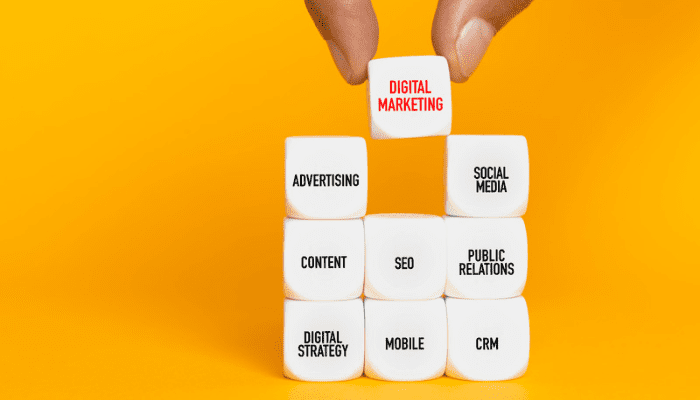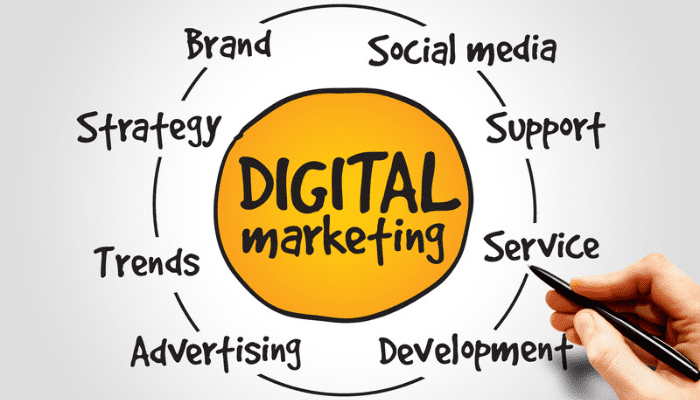In today’s virtual world, digital marketing has become a crucial tool for small business owners to reach a wider audience at a reduced cost compared to traditional marketing methods. With well-designed digital marketing platforms, small businesses can expand their sales to a larger market and effectively compete with larger companies.
Furthermore, digital marketing allows small businesses to connect with their customers in real-time, build relationships, and gain valuable insights into customer behavior. The ability to track and measure results enables small business owners to adjust their strategies based on what works, making their marketing campaigns more efficient and effective. Ultimately, digital marketing can drive growth, boost sales, and improve the bottom line for small businesses.
What is Digital Marketing
The term “digital marketing” encompasses various tactics that utilize the internet, mobile devices, social media, search engines, and other channels to connect with potential consumers. This field is vast, encompassing email marketing, content creation, search engine optimization, social media management, and more.
Digital marketing’s significance lies in its ability to attract specific audiences, as digital platforms offer real-time interaction with prospects. Whether your business offers products or services, employing digital marketing techniques can greatly expand your customer base.
Through leveraging digital marketing tools and resources, businesses are able to reach their target audience and track consumer behavior with ease. This data-driven marketing approach allows companies to gauge what works and what doesn’t in their marketing strategy, enabling them to make necessary adjustments and improvements.

Digital Marketing vs Traditional Marketing
Digital and traditional marketing serve the same fundamental purpose: to market products or services to consumers. However, they do so in different ways and through different mediums.
Traditional marketing refers to any marketing that isn’t online. This includes print advertisements in newspapers or magazines, billboards, television commercials, radio ads, direct mail, and other offline, physical marketing forms. Traditional marketing methods allow businesses to reach a broad audience, but it cannot be easy to track the effectiveness of these campaigns.
On the other hand, digital marketing includes all marketing efforts that use the internet or electronic devices. Businesses leverage digital channels such as search engines, social media, email, and other websites to connect with current and prospective customers. Digital marketing allows businesses to target specific audiences, track campaign performance in real-time, and adjust strategies based on the insights gathered from consumer interactions.
While traditional marketing still has its place, digital marketing has gained significant importance due to its cost-effectiveness, reach, and ability to engage with customers.
Components of Digital Marketing
Digital marketing is a comprehensive strategy aimed at connecting with customers online through various channels and cultivating relationships. The following are its key elements:
- Search Engine Optimization (SEO): SEO is optimizing your online content so that a search engine likes to show it as a top result for searches of specific keywords. It's the practice of increasing both the quality and quantity of website traffic and exposure to your brand through non-paid (also known as "organic") search engine results.
- Content Marketing: This is a strategic marketing approach focused on creating and distributing valuable, relevant, and consistent content to attract and retain a clearly-defined audience — and, ultimately, to drive profitable customer action.
- Social Media Marketing: Promoting your content and interacting with your target consumers on social media channels like Facebook, Instagram, LinkedIn, and Pinterest. This is a powerful way for businesses of all sizes to reach prospects and customers.
- Email Marketing: Businesses use email marketing to communicate with their audiences. Email is often used to promote content, discounts, and events and to direct people toward the business's website.
- Pay-Per-Click (PPC): PPC drives traffic to your website by paying a publisher every time your ad is clicked. One of the most common types of PPC is Google Ads, which allows you to pay for top slots on Google's search engine results pages at a price "per click" of the links you place.
Every element of digital marketing is essential and has a significant impact on a company’s online image and prosperity.
Developing A Strategy
In order to attain your company’s objectives through online marketing, it is crucial to create a digital marketing plan that effectively utilizes the available tools and resources in a cost-efficient manner. This plan should include owned, earned, and paid media channels, which can be integrated to create a cohesive campaign focused on a particular line of business. The key components of such a plan are as follows:
- Creating a Digital Marketing Plan: A digital marketing plan is a document sharing the details for all the planning for your digital marketing campaigns or actions. It details, among other things: your business goals, the state of your current business, your target audience, and your marketing strategies.
- Target Audience Identification: This involves identifying the group of people that you’re trying to reach with your products or services. These are the people who are most likely to become your customers, and they are known as your target audience.
- Choosing the Right Channels: Depending on your target audience, some digital marketing channels may be more effective than others. For example, if your target audience is young adults, platforms like Instagram and Snapchat are likely to be more effective than LinkedIn or Email marketing.
- Measuring Success: Key Performance Indicators (KPIs): KPIs are quantifiable measures used to evaluate the success of a business, employee, etc. in meeting objectives for performance. In digital marketing, KPIs may include metrics like website traffic, click-through rates, conversion rates, etc.
A well-planned strategy will help a business define its online presence and achieve its marketing goals.
Pardon The Interruption
Did You Know? There are great opportunities for no-charge webinars about Digital Marketing during July.
We’d love to add your name to the list of Entrepreneurs looking to up their game.
What Does the Future Look Like
We live in an evolving marketing world with the emergence of new technologies and shifts in consumer behavior. Here are some upcoming trends to keep an eye on:
- Artificial Intelligence and Machine Learning: AI and machine learning are integrated into digital marketing to analyze consumer behavior and search patterns in order to understand how customers, find products and services. This helps businesses understand their target audience better and deliver more personalized customer experiences.
- Voice Search Optimization: With the rise of digital assistants like Siri, Alexa, and Google Assistant, voice search is becoming a popular way to search the internet. Businesses are optimizing their websites for voice search to improve their search engine rankings.
- Personalization and Customer Experience: Personalization is becoming more important in digital marketing. Businesses use data to better understand their customers and deliver more personalized experiences, from product recommendations to targeted emails.
- Influencer Marketing: Influencer marketing continues to be a dominant force in digital marketing. Businesses collaborate with influencers on social media to reach a larger audience and build trust with potential customers.
These trends are shaping the future of digital marketing, and businesses need to adapt to stay competitive.

Conclusion
Small business owners must be well-versed in digital marketing language and concepts to thrive in today’s ever-changing market. Embracing the power these concepts hold, you can help scale and grow your business, ultimately impacting long-term sustainability and success. It is crucial to apply digital marketing strategies for optimal business results.
If you would like to learn more about digital marketing, check our training event calendar for virtual workshops on this topic, or email our training coordinator by emailing us at: HelpMyBusiness@CommunitiesU.Org and request to be put on our email notification list for future training events or register to access our online, self-paced, virtual training courses.

